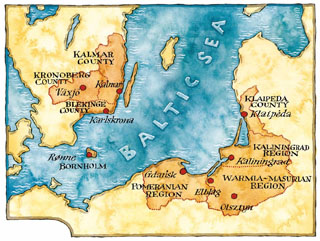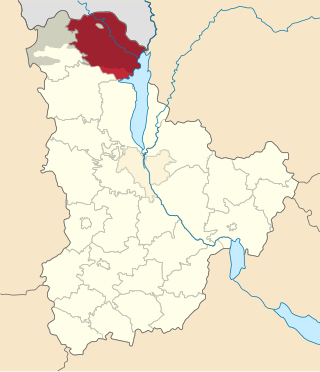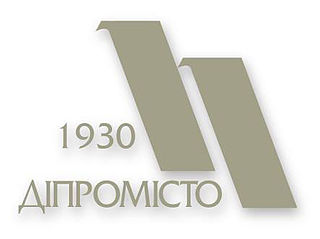
Chernobyl or Chornobyl is a partially abandoned city in the Chernobyl Exclusion Zone, situated in the Vyshhorod Raion of northern Kyiv Oblast, Ukraine. Chernobyl is about 90 kilometres (60 mi) north of Kyiv, and 160 kilometres (100 mi) southwest of the Belarusian city of Gomel. Before its evacuation, the city had about 14,000 residents. While living anywhere within the Chernobyl Exclusion Zone is technically illegal today, authorities tolerate those who choose to live within some of the less irradiated areas, and around 1,000 people live in Chernobyl today.
Danish Committee for Aid to Afghan Refugees (DACAAR)(Danish: Den danske komité for hjælp til afghanske flygtninge) is a non-political, non-governmental, non-profit humanitarian and development organization working to improve the lives of the Afghan people since 1984.

Gennady Grushevoy was a Belarusian academic, politician, human rights and environmental activist and the founder of one of the first Chernobyl relief foundations. He was awarded the 1999 Rafto Prize for “his many years of courageous work for democracy and human rights in Belarus”.

The European Structural and Investment Funds are financial tools governed by a common rulebook, set up to implement the regional policy of the European Union, as well as the structural policy pillars of the Common Agricultural Policy and the Common Fisheries Policy. They aim to reduce regional disparities in income, wealth and opportunities. Europe's poorer regions receive most of the support, but all European regions are eligible for funding under the policy's various funds and programmes. The current framework is set for a period of seven years, from 2021 to 2027.

Chernobyl Children International (CCI) is a non-profit, international development, medical, and humanitarian organisation that works with children, families and communities that continue to be affected by the economic outcome of the 1986 Chernobyl accident. The organisation's founder and chief executive is Adi Roche. Before 2010, it was known as Chernobyl Children's Project International (CCPI).

The European Social Fund Plus (ESF+) is one of the European Structural and Investment Funds (ESIFs), which are dedicated to improving social cohesion and economic well-being across the regions of the Union. The funds are redistributive financial instruments that support cohesion within Europe by concentrating spending on the less-developed regions.

Slavutych is a city and municipality in northern Ukraine, purpose-built for the evacuated personnel of the Chernobyl Nuclear Power Plant after the 1986 disaster that occurred near the city of Pripyat. Geographically located within Chernihiv Raion, Chernihiv Oblast, Slavutych is administratively subordinated to the Kyiv Oblast and is part of Vyshhorod Raion. It hosts the administration of Slavutych urban hromada, one of the hromadas of Ukraine. In 2021 the city had a population of 24,464.

The CIFAL Global Network is part of the United Nations Institute for Training and Research (UNITAR). The Network comprises 25 International Training Centres (CIFALs) and aims to serve as a platform for capacity-building of government authorities and civil society leaders on topics related to sustainable development, as well as on global mandates and goals of the United Nations. Since its inception in 2003, the Network has trained more than 60,000 beneficiaries through over 600 training and knowledge-sharing events. It reached more than 10,000 beneficiaries from 75 countries in 2015.
Interreg is a series of programmes to stimulate cooperation between regions in and out of the European Union (EU), funded by the European Regional Development Fund. The first Interreg started in 1989. Interreg IV covered the period 2007–2013. Interreg V (2014–2020) covers all 27 EU member states, the EFTA countries, six accession countries and 18 neighbouring countries. It has a budget of EUR 10.1 billion, which represents 2.8% of the total of the European Cohesion Policy budget. Since the non EU countries don't pay EU membership fee, they contribute directly to Interreg, not through ERDF.

Disaster risk reduction (DRR) is a systematic approach to identifying, assessing and reducing the risks of disaster. It aims to promote sustainable development by increasing the resilience of communities to any disasters they might face. DRR is normally used as policies intended to "define goals and objectives across different timescales and with concrete targets, indicators and time frames." The concept is also called disaster risk management (DRM).

Humanity First is an international charity that provides disaster relief and long term development assistance to vulnerable communities in 52 countries across 6 continents. The organisation is run by volunteers with diverse skillsets across the world and has access to thousands of extra volunteers worldwide. Volunteer staff in all areas often pay their own expenses to support the international projects.

The Leeds City Region, or informally Greater Leeds, is a local enterprise partnership city region located in West Yorkshire, England. Prior to the West Yorkshire devolution deal, the partnership covered parts of South and North Yorkshire. According to the Office for National Statistics, as of 2017 the city region ranked 2nd behind Greater London for both population and GVA in the United Kingdom. It has a population of 2,320,214 million and a GVA of £69.62 billion.

The Euroregion Baltic (ERB) refers to a cross-border Euroregion in the south-east of the Baltic Sea Region, consisting of eight regions of Denmark, Lithuania, Poland, Russia, and Sweden. On 2 March 2022, the ERB's Executive Board suspended Russia's membership, in response to Russia's invasion of Ukraine.
Rural Reconstruction Nepal (RRN) (Nepali: नेपाल ग्रामीण पुनर्निर्माण संस्था) is a non-government, not for profit, social development organisation in Nepal, initiated in 1989 in the form of a small organisation created by a group of creative graduates of the Institute of Agriculture and Animal Science in Chitwan district with its initial name 'Grass Roots Institute for Training and Services-Nepal (GRITS-Nepal)'. By subscribing to the basic principles of the International Rural Reconstruction Movement, GRITS-Nepal was renamed and officially registered in 1993 as Rural Reconstruction Nepal (RRN). With the passage of time, RRN has been able to expand itself into one of the fast-growing NGOs in the country together with its diverse development programmes covering the vast geographical area and the population.

Danish Demining Group (DDG) is the Human Security Unit under the Danish Refugee Council (DRC), specialised in clearing landmines and unexploded ordnance and reducing armed violence.
The International Centre for Policy Studies (ICPS) is an independent NGO, founded in 1994 which aims to promote public policy concepts and practice and apply them to influential policy research that affects both the public and private sectors in Ukraine.

Coastal & Marine Union (EUCC) is a nonprofit organization with a membership of around 500 institutions, NGOs and experts, in 40 countries. Its network at large involves about 2500 professionals involved in coastal and marine management issues. Founded in 1989 with the aim of promoting coastal management by bridging the gap between scientists, environmentalists, site managers, planners and policy makers, it has grown into the largest network of coastal practitioners and experts in Europe, with 13 National Branches, an International Secretariat in Leiden, and offices in Barcelona (Spain), Biarritz (France), Warnemünde (Germany), Szczecin (Poland), Klaipeda (Lithuania) and Sliema (Malta). EUCC's working area is Europe and its neighbouring regions, especially the Black Sea and the Mediterranean.

Chernobyl Raion or Chornobyl Raion was a raion in the Soviet Union located in the Ukrainian Soviet Socialist Republic. It was one of 26 administrative raions (districts) of Kyiv Oblast in northern Ukraine. After the Chernobyl disaster, the majority of the raion was contaminated, and many of its populated places were included into the Chernobyl Exclusion Zone, which is an officially designated exclusion area around the site of the disaster.

DIPROMISTO is a research and planning institute in the field of spatial and urban planning in Ukraine. It is a state enterprise within the field of governance of the Ministry of Regional Development, Construction and Housing of Ukraine. It was established on September 12, 1930. Its full name is State Enterprise Y. Bilokon Ukrainian State Scientific-Research Institute of Urban Design "DIPROMISTO".




















